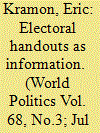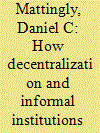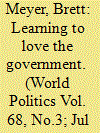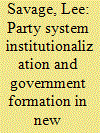|
|
|
Sort Order |
|
|
|
Items / Page
|
|
|
|
|
|
|
| Srl | Item |
| 1 |
ID:
146056


|
|
|
|
|
| Summary/Abstract |
Why is vote buying effective even where ballot secrecy is protected? Most answers emerge from models of machine politics, in which a machine holds recipients of handouts accountable for their subsequent political behavior. Yet vote buying is common in many contexts where political party machines are not present, or where parties exert little effort in monitoring voters. This article addresses this puzzle. The author argues that politicians often distribute electoral handouts to convey information to voters. This vote buying conveys information with respect to the future provision of resources to the poor. The author tests the argument with original qualitative and experimental data collected in Kenya. A voter's information about a candidate's vote buying leads to substantial increases in electoral support, an effect driven by expectations about the provision of clientelist benefits beyond the electoral period. The results, showing that the distribution of material benefits can be electorally effective for persuasive reasons, thereby explain how vote buying can be effective in the absence of machine politics.
|
|
|
|
|
|
|
|
|
|
|
|
|
|
|
|
| 2 |
ID:
146054


|
|
|
|
|
| Summary/Abstract |
Political decentralization is often argued to strengthen political accountability by bringing government closer to the people. Social and civic institutions at the local level, such as lineage associations, temples, churches, or social clubs, can make it easier for citizens to monitor officials and hold them accountable. This article argues that strong social institutions also empower local elites who may use their informal influence to control their group and capture rents. Drawing on evidence from case studies of Chinese villages, the article shows that lineage group leaders who become village officials use their combination of social and political authority to confiscate villagers’ land. Evidence from a survey experiment suggests that endorsement of a land confiscation plan by lineage elites elicits greater compliance with property seizures. A national survey indicates that when a lineage leader becomes a village cadre, it is associated with a 14 to 20 percent increase in the likelihood of a land expropriation. The findings demonstrate how informal institutions and local civil society can be tools of top-down political control.
|
|
|
|
|
|
|
|
|
|
|
|
|
|
|
|
| 3 |
ID:
146058


|
|
|
|
|
| Summary/Abstract |
One counterintuitive variation in wage-setting regulation is that countries with the highest labor standards and strongest labor movements are among the least likely to set a statutory minimum wage. This, the author argues, is due largely to trade union opposition. Trade unions oppose the minimum wage when they face minimal low-wage competition, which is affected by the political institutions regulating industrial action, collective agreements, and employment, as well as by the skill and wage levels of their members. When political institutions effectively regulate low-wage competition, unions oppose the minimum wage. When political institutions are less favorable toward unions, there may be a cleavage between high- and low-wage unions in their minimum wage preferences. The argument is illustrated with case studies of the UK, Germany, and Sweden. The author demonstrates how the regulation of low-wage competition affects unions’ minimum wage preferences by exploiting the following labor market institutional shocks: the Conservatives’ labor law reforms in the UK, the Hartz labor market reforms in Germany, and the European Court of Justice's Laval ruling in Sweden. The importance of union preferences for minimum wage adoption is also shown by how trade union confederation preferences influenced the position of the Labour Party in the UK and the Social Democratic Party in Germany.
|
|
|
|
|
|
|
|
|
|
|
|
|
|
|
|
| 4 |
ID:
146057


|
|
|
|
|
| Summary/Abstract |
Party systems provide the essential structure of the coalition bargaining environment. Stability in party systems ensures the presence of regularities that can be observed in government formation, but most empirical research focuses on established democracies. In new democracies, party systems are less institutionalized, which means that interactions between parties can be unpredictable and has significant implications for coalition formation. This article presents the first study of coalition formation in new democracies that employs an empirical design comparable to that of the leading research on Western Europe. The author uses a new data set of potential coalitions in Central and Eastern Europe to examine three explanations for government formation that arise when party systems are weakly institutionalized. The results show first that incumbency is a disadvantage for governments in new democracies when formation occurs postelection. This disadvantage is due to high levels of electoral volatility caused by policy failure and clientelistic practices. Incumbents are advantaged when formation takes place midterm, as weak party system institutionalization leads to an inchoate pattern of interaction between opposition parties, which therefore fail to provide a viable alternative. Second, the presence of former dominant parties influences government formation by stifling the development of programmatic competition. Instead, programmatic competition is subjugated to contestation based on historical enmities. And third, established parties collude to exclude new parties from coalition formation—a possible indicator that a party system is becoming more institutionalized. The article provides new insights into the importance of routinized and stable political practices and institutions.
|
|
|
|
|
|
|
|
|
|
|
|
|
|
|
|
| 5 |
ID:
146055


|
|
|
|
|
| Summary/Abstract |
There is heated debate over the wisdom and effect of secrecy in international negotiations. This debate has become central to the process of foreign investment arbitration because parties to disputes nearly always can choose to hide arbitral outcomes from public view. Working with a new database of disputes at the world's largest investor-state arbitral institution, the World Bank's International Centre for Settlement of Investment Disputes, the authors examine the incentives of firms and governments to keep the details of their disputes secret. The authors argue that secrecy in the context of investment arbitration works like a flexibility-enhancing device, similar to the way escape clauses function in the context of international trade. To attract and preserve investment, governments make contractual and treaty-based promises to submit to binding arbitration in the event of a dispute. They may prefer secrecy in cases when they are under strong political pressure to adopt policies that violate international legal norms designed to protect investor interests. Investors favor secrecy when managing politically sensitive disputes over assets they will continue to own and manage in host countries long after the particular dispute has passed. Although governments prefer secrecy to help facilitate politically difficult bargaining, secrecy diminishes one of the central purposes of arbitration: to allow governments to signal publicly their general commitment to investor-friendly policies. Understanding the incentives for keeping the details of dispute resolution secret may help future scholars explain more accurately the observed patterns of wins and losses from investor-state arbitration as well as patterns of investment.
|
|
|
|
|
|
|
|
|
|
|
|
|
|
|
|
|
|
|
|
|